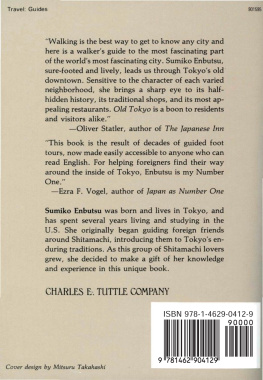Ezra F. Vogel - Japans New Middle Class: The Salary Man and His Family in a Tokyo Suburb
Here you can read online Ezra F. Vogel - Japans New Middle Class: The Salary Man and His Family in a Tokyo Suburb full text of the book (entire story) in english for free. Download pdf and epub, get meaning, cover and reviews about this ebook. year: 1972, publisher: University of California Press, genre: Home and family. Description of the work, (preface) as well as reviews are available. Best literature library LitArk.com created for fans of good reading and offers a wide selection of genres:
Romance novel
Science fiction
Adventure
Detective
Science
History
Home and family
Prose
Art
Politics
Computer
Non-fiction
Religion
Business
Children
Humor
Choose a favorite category and find really read worthwhile books. Enjoy immersion in the world of imagination, feel the emotions of the characters or learn something new for yourself, make an fascinating discovery.
- Book:Japans New Middle Class: The Salary Man and His Family in a Tokyo Suburb
- Author:
- Publisher:University of California Press
- Genre:
- Year:1972
- Rating:3 / 5
- Favourites:Add to favourites
- Your mark:
- 60
- 1
- 2
- 3
- 4
- 5
Japans New Middle Class: The Salary Man and His Family in a Tokyo Suburb: summary, description and annotation
We offer to read an annotation, description, summary or preface (depends on what the author of the book "Japans New Middle Class: The Salary Man and His Family in a Tokyo Suburb" wrote himself). If you haven't found the necessary information about the book — write in the comments, we will try to find it.
Ezra F. Vogel: author's other books
Who wrote Japans New Middle Class: The Salary Man and His Family in a Tokyo Suburb? Find out the surname, the name of the author of the book and a list of all author's works by series.
Japans New Middle Class: The Salary Man and His Family in a Tokyo Suburb — read online for free the complete book (whole text) full work
Below is the text of the book, divided by pages. System saving the place of the last page read, allows you to conveniently read the book "Japans New Middle Class: The Salary Man and His Family in a Tokyo Suburb" online for free, without having to search again every time where you left off. Put a bookmark, and you can go to the page where you finished reading at any time.
Font size:
Interval:
Bookmark:
Preferred Citation: Vogel, Ezra F. Japan's New Middle Class: The Salary Man and His Family in a Tokyo Suburb, Second edition. Berkeley: University of California Press, 1971 [c1963] 1971 1963. http://ark.cdlib.org/ark:/13030/ft8z09p23r/
 | Japan's New Middle Class The Salary Man and His Family in a Tokyo Suburb by Ezra F. Vogel UNIVERSITY OF CALIFORNIA PRESS Berkeley Los Angeles Oxford 1971 The Regents of the University of California |
TO OUR FAMILIES:
Joe Vogels, C. W. Halls, and The Six Families of Mamachi
Preferred Citation: Vogel, Ezra F. Japan's New Middle Class: The Salary Man and His Family in a Tokyo Suburb, Second edition. Berkeley: University of California Press, 1971 [c1963] 1971 1963. http://ark.cdlib.org/ark:/13030/ft8z09p23r/
TO OUR FAMILIES:
Joe Vogels, C. W. Halls, and The Six Families of Mamachi
We have kept up contact with our Mamachi families over the years, and in the summer of 1969, precisely ten years after we began our original study, we returned to visit the families we had known. The results of our ten year follow-up are presented in a new chapter, "Mamachi Revistited."
E.F.V.
This study, based on field work which my wife and I conducted in Japan from 1958 to 1960, is an attempt to describe the life of the salary man and his family. In our field work, in order to penetrate beyond superficial appearances and to develop an intimate familiarity with a number of families, we focused particularly on one community where we lived for the last year of our study. We shall call our community Mamachi. Such an intensive study has required the closest co-operation of many Mamachi families. The residents of Mamachi do not take obligations lightly, and we, too, cannot take lightly the fact that we can never repay adequately their kindness and the inconveniences we caused them. We can only hope to prove worthy of their time and effort by portraying their lives as accurately as we know how without sacrificing their anonymity. To these unnamed families, then, we express our deepest thanks.
During the period of field work, the Japanese National Institute of Mental Health provided office space, made arrangements for our field work, made available their case materials, permitted my wife to be the psychiatric social worker for a patient on a regular basis, and accorded us the full privileges of regular staff members. Various members of the staff explained intricacies of their cases, gave and interpreted projective tests to families in our study, and patiently answered an endless number of questions.
I have benefited from the guidance of members of the Sociology Department of the University of Tokyo, the Japanese Psychoanalytic Association, the Group for the Study of the Family directed by Professor Takashi Koyama, and an informal seminar on family studies directed by Professor Yuzuru Okada. Dr. Takeo Doi, a psychia
trist who has practiced in Japan and the United States, generously shared many facets of his deep understanding of Japanese behavior. Professor Tokusaburo Abe of Yamagata University, Professor Tetsuro Sasaki of Tohoku University, and Professor Kenneth Morioka of International Christian University and their staffs and students assisted in the development, distribution, and coding of questionnaires. Professor Tadashi Fukutake and Professor Takeyoshi Kawashima of Tokyo University kindly let me join them on field trips to the country.
At various stages in the work, I have been ably assisted by Hiroshi Satake, Mitsuko Minowa, Michiko Kiuchi, Fumiko Kamiyama Sasaki, Miyoko Sasaki, Hisa Hirada, Yaeko Sato, Sumiko Embutsu, Sumiko Iwao, Tomoko Yagai, Emily Cohen, and Marie Wilson.
Dr. William Caudill first interested me in going to Japan and has been a constant source of support and counsel in all stages of the work. Dr. John Spiegel and Dr. Florence Kluckhohn gave me several years of training in field work and in the analysis of value-orientations and implicit roles, and their study was the model on which I based my research design. Both before and after the field work, I profited from discussions with Professor John Pelzel, who has a uniquely broad perspective on Japan, combining behavioral science theory and methods with an intimate knowledge of Japanese society and history. Professor Ronald Dore's excellent work, City Life in Japan, appeared just before the beginning of our field work and provided an invaluable background for the present study.
I have benefited from the stimulation and unselfish guidance of other teachers, particularly Professor Hubert Bonner of Ohio Wesleyan University, Dr. Aaron Beck of Philadelphia, and Professor Talcott Parsons, Professor Robert Bales, and Professor George Homans of Harvard University. The analytic framework for the present study owes much to Dr. Norman Bell and follows closely the outline which he and I developed.[*] Members of an informal seminar under the direction of Dr. Theodore Lidz of the Yale Psychiatry Department and a seminar in the Harvard Medical School directed by Dr. John Spiegel, Dr. Florence Kluckhohn, and myself gave valuable insight into clinical aspects of the case materials I collected in Japan.
[*] Norman W. Bell and Ezra F. Vogel, eds., A Modern Introduction to the Family (Glencoe, Ill.: The Free Press, 1960).
After I returned from Japan, discussions with Professors Masao Maruyama and Takeshi Ishida of Tokyo University on political thought and with Professor Kazuo Noda of Rikkyo University on the structure of the business firm have been particularly enlightening.
The final version of the manuscript reflects my indebtedness for the careful reading and thoughtful criticism of an earlier draft by Norman Bell, Robert Bellah, Vin Brandt, William Caudill, Al Craig, George De Vos, Peter Dodd, Takeo Doi, Ronald Dore, Samuel M. Eisenstadt, Sumiko and Coe Embutsu, Takeshi Ishida, Jack Knowles, Victor Lidz, Kenneth Morioka, Yonosuke Nagai, Kazuo Noda, John Pelzel, David Plath, David Riesman, Robert J. Smith, Yonina Talmon, and Kenichi Tominaga. Max Knight of the University of California Press has made preparation for publication painless and even pleasant by being careful in his editing, gentle in his reproach, and expeditious in moving the manuscript through to final form.
The field work was financed by a grant from the Foundations' Fund for Research in Psychiatry, under arrangements with the Laboratory of Social Relations at Harvard. Small grants from the National Institute of Mental Health and the support of the Department of Psychiatry at Yale and the East Asian Research Center at Harvard greatly facilitated the analysis of data.
In many ways my wife Suzanne should be coauthor. She fully shared the problems of planning and carrying out the field work, and the life of a wife-mother-interviewer in another culture was more demanding than either of us might have imagined. Although she did not take part in the actual writing, she has been a patient sounding board, and her concern with individual cases provided a needed balance to my irrepressible desire to paint the broad picture.
E. F. V.
CAMBRIDGE, MASSACHUSETTS JANUARY, 1963
THE SIGNIFICANCE OF SALARY
The Problem and Its Setting
Among the non-Western nations, only Japan has reached a level of industrialization and urbanization comparable to the advanced countries of Europe and America. From a nation that only one hundred years ago was voluntarily isolated from the developments of the rest of the world, Japan has become an important member of the international community. In a single century, Japan has not only introduced modern technology but kept pace with continuing Western progress. At the same time, modern systems of education, government, business, transportation, and communication have become firmly implanted in Japanese society.
Font size:
Interval:
Bookmark:
Similar books «Japans New Middle Class: The Salary Man and His Family in a Tokyo Suburb»
Look at similar books to Japans New Middle Class: The Salary Man and His Family in a Tokyo Suburb. We have selected literature similar in name and meaning in the hope of providing readers with more options to find new, interesting, not yet read works.
Discussion, reviews of the book Japans New Middle Class: The Salary Man and His Family in a Tokyo Suburb and just readers' own opinions. Leave your comments, write what you think about the work, its meaning or the main characters. Specify what exactly you liked and what you didn't like, and why you think so.










